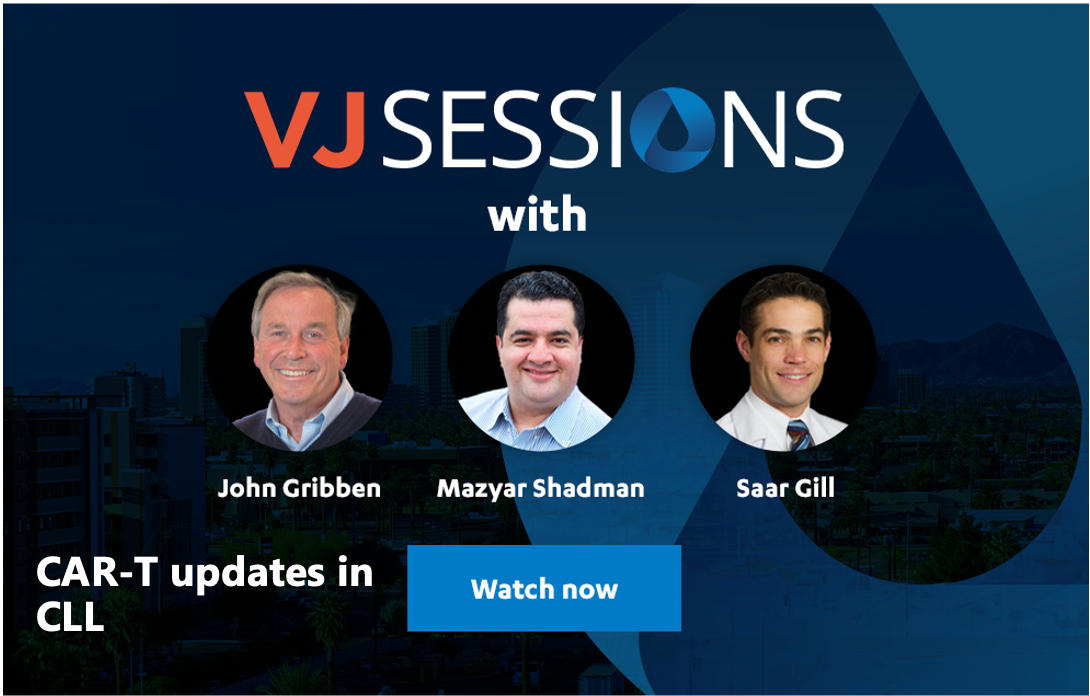Educational content on VJHemOnc is intended for healthcare professionals only. By visiting this website and accessing this information you confirm that you are a healthcare professional.
Welcome to The VJSessions brought to you by the Video Journal of Hematological Oncology (VJHemOnc)! In this exclusive roundtable session, Kedar Kirtane, Laura Oswald, and Heather Jim, talk on the importance of studying patient-reported outcomes in CAR-T recipients prospectively. The experts highlight the key results of two studies exploring patient-reported outcomes using different measures, including biometric data, patient-reported outcomes surveys, as well as symptomatic toxicities of cytokine release syndrome (CRS) and neurotoxicity. Finally, the speakers discuss the possibility of standardizing symptoms across patients treated with CAR-T.
Patient-reported outcomes in CAR-T recipients
Kedar Kirtane:
My name is Kedar Kirtane. I’m an assistant member in the department of head, neck, and endocrine malignancies at Moffitt Cancer Center, and I have with me today, Dr Laura Oswald and Dr Heather Jim, both from the department of health outcomes and behavior, and we just finished our patient-focused session. So Dr Oswald, perhaps you could provide a summary of the talk you just had.
Laura Oswald:
Sure so I was presenting data from our study, as you know, our pilot study in which we enrolled patients receiving cell therapy to fill out patient-reported outcome surveys at several time points post cell infusion, as well as wear a Fitbit so we could collect some biometric data like steps, sleep, things like that. And I was really happy to share that we met all of our benchmarks for feasibility and acceptability, so we plan to do this sort of data collection on a larger scale in the future. Based on some of our just kind of preliminary data exploring, there were some interesting patterns that emerged. We saw that patients who had a partial response to treatment or better seemed to have more severe toxicity burden over time relative to patients that had progressive disease. I think just kind of some really intriguing initial things that we were finding in the data that I’m excited to explore on a larger scale.
Kedar Kirtane:
Why do you think, I know we all know this, but why do you think for the audience why patient-reported outcomes is important to study prospectively for this patient population?
Laura Oswald:
Yeah, there’s a high risk for severe toxicities from cell therapies, as you know, and getting the patient perspective of what they’re experiencing in their body based on their disease and their treatment is a really nice complement to what clinicians are able to observe and when we look at the data, sometimes they differ a little bit and both are important perspectives to get. To date, there hasn’t been a lot of patient-reported outcomes, work in CAR-T therapies and CAR-T trials, so this is just kind of dipping our toe in the water and seeing what’s there. There’s a lot of exciting direction there
Kedar Kirtane:
That kind of segues nicely to Dr Jim’s study, so perhaps you could summarize it for us.
Heather Jim:
Sure. So we conducted, I think one of the first studies of patient-reported outcomes in CAR-T in the sense that we started in 2017, and we were asking patients about symptomatic toxicities of cytokine release syndrome and neurotoxicity. And what we found was that on average, patients had sort of moderate symptoms that kind of peaked at that level within 14 days after their treatment, and then resolved till about 90 days post, and then were pretty stable after that for mild to minimal side effects. For cognition, things were a little bit different. We asked people about their problems with memory, their problems with language, being organized and things like that, and people reported the most problems with memory and with language things, like word generation, and actually that continued to get worse over time in the year after CAR-T. However, we know that patients who’ve had cancer often have to engage in more effortful cognitive processing to achieve the same cognitive performance as people without cancer, and so it may be that as they finish their CAR-T and they start to get back to life as it was before their treatment, that they’re just noticing more of that effortful processing, so remains to be seen whether there really are objective neurocognitive deficits that people experience long term.
Kedar Kirtane:
Really interesting work. I know some of the clinicians had a question about standardizing symptoms across patients. Could you just discuss briefly the collaboration with the mathematical oncology group at Moffitt?
Heather Jim:
Yeah, sure. So, an important part of patient-reported outcomes is the fact that it’s patient’s own perception of what’s happening and patients can vary pretty widely in terms of what they perceive their symptoms are. We’ve been working with the integrative mathematical oncology program at Moffitt to actually standardize patients’ reports those symptoms to kind of their own norm so that we can more readily see when they’re reporting something that’s abnormally high for them or abnormally low or maybe improving. We think that that’ll be helpful moving forward to standardize LPRs.
Kedar Kirtane:
Yeah, I think we all hope that we can prospectively get a lot of information and it be incorporated in all these clinical trials. So thank you so much for listening.











